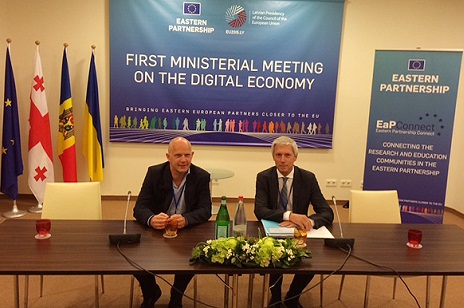EU’s high-speed Internet network boosts research cooperation across EaP

Researchers and students across Georgia will soon be able to fully participate in the digital economy thanks to the European Union’s (EU) high-speed Internet network project for Eastern Partnership (EaP) countries.
The European Commission signed a €13 million contract with networking organisation GÉANT to expand connectivity in Georgia and five other EaP countries – Armenia, Azerbaijan, Belarus, Moldova and Ukraine.
The project aimed to create a regional high-speed Internet network dedicated to research and education (R&E) across EaP nations. It will interconnect the National Research and Education Networks (NRENs) in EaP partner countries and integrate them in the pan-European GÉANT network.
EU Ministers responsible for the Digital Economy and their representatives met their Georgian, Armenian, Azerbaijani, Belarus, Moldovan and Ukrainian counterparts on Thursday to discuss the challenges and opportunities of the digital economy of the EaP.
They said two million scientists, academics and students at over 700 institutions across the region would benefit from this new project. This high-speed broadband network will enable access and exchange between scientific databases and facilitate international cooperation via faster data transfer.
"Closer digital integration offers great potential for trade growth and wider economic cooperation – for all of us,” Vice President for the Digital Single Market on the European Commission Andrus Ansip said.
"It is in everyone's interests, on all sides, for the Eastern Partnership countries to build stronger EU ties, whether in transport, energy or in aligning digital markets: the next stage of our cooperation, which starts today."
By enabling fast and reliable exchange of high volumes of data between scientists in EaP countries and their peers in Europe and further afield, the project will facilitate collaborative research in areas such as environmental monitoring, telemedicine, life sciences and physics.
"In addition, stable videoconferencing will support e-learning initiatives or simply enable artists, thousands of miles apart, to perform together in near-real time,” authorities said.
 Tweet
Tweet  Share
Share